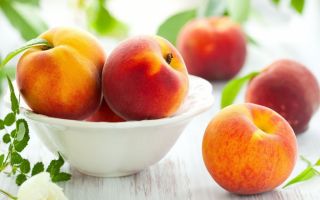Content
- 1 Peach chemical composition
- 2 Nutritional value and calorie content of peach
- 3 Useful and medicinal properties of peach
- 4 Can peaches during pregnancy and breastfeeding
- 5 The benefits of peaches for weight loss
- 6 Features of the use of peaches for certain diseases
- 7 The benefits and harms of canned peaches
- 8 Are dried and sun-dried peaches good for you?
- 9 The benefits of peach pits and peach leaves
- 10 Why is peach juice useful?
- 11 Peach face masks
- 12 Which is healthier: peach or nectarine
- 13 What can be made from peaches
- 14 Harm of peaches and contraindications
- 15 How to choose and store peaches
- 16 Conclusion
The benefits and harms of peaches are an important issue, since the vast majority of people consume these fruits. It is necessary to figure out what properties the fruits have and what effect they have on the body.
Peach chemical composition
There are quite a few peach varieties - the fruits are large and small, yellow and with a reddish "blush", smooth and velvety. But any peaches have one thing in common - a composition saturated with useful substances. The fruits of this fruit contain:
- the most valuable mineral elements - iron, zinc and phosphorus, as well as a large amount of potassium, calcium and magnesium;
- basic vitamins - C, E, K and B;
- carotene;
- fiber and fructose;
- natural useful acids - malic, tartaric, citric;
- antioxidants;
- flavonoids.
Thus, the beneficial properties of fig peach, nectarine and other varieties of fruit will be about the same. The consumption of fruits supports the healthy functioning of internal organs, and the regular presence of fruit in the diet strengthens the entire body as a whole.
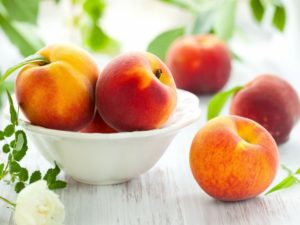
Nutritional value and calorie content of peach
The fruit is characterized by a high carbohydrate content - about 9.5 g in each fruit. There is much less protein, about 0.9 g, very little fat - no more than 0.1 g.
As for the calorie content, it depends on the way the fruit is processed.
|
Peach processing method |
Calorie content per 100 g |
|
Fresh peach |
45 calories |
|
Dried or sun-dried peach |
253 calories |
|
Fresh peach juice |
40 calories |
|
Canned Peaches |
73 calories |
The table shows that fresh fruits and natural juice are very low in calories - but processed peach slices have increased nutritional value.
Useful and medicinal properties of peach
Fruit fruits not only taste good. They are highly regarded for their beneficial properties to the body. In particular, peaches:
- strengthen eyesight due to the increased carotene content;
- improve digestion, since the composition contains a whole complex of fruit acids and a large amount of fiber;
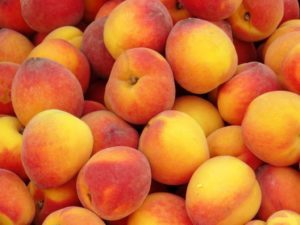
- increase appetite and relieve nausea;
- regulate blood sugar levels due to increased fructose content;
- acts as a good diuretic and can dissolve sand and small kidney stones;
- have a cleansing effect on the body - this is the benefit of peaches for the liver;
- have a beneficial effect on the condition of the skin - improve the elasticity of the epidermis and smooth out wrinkles, and also promote early healing in case of dermatological irritations;
- serve as the prevention of oncology, as they increase immunity and bind free radicals in the body;
- have a slight anti-aging effect and have a good effect on the nervous system.
For women
The benefit of fresh peaches for women is that the properties of the fruit have a positive effect on the appearance, improve the condition of the skin and hair. Eating fruits during PMS will have a beneficial effect on mood and overall well-being.
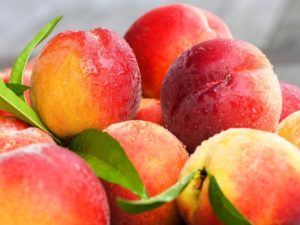
The product helps to shed excess weight and maintains slimness. Peaches at night can be used during a diet - this will also greatly delight women who are periodically forced to severely restrict themselves to food.
For men
Since fruits contain a large amount of zinc, they regulate hormonal balance in the male body. Also, the use of the fruit protects the stronger sex from prostate diseases.
For children
In general, the properties of the product are very useful for babies - fruits normalize digestion, saturate the growing body with vitamins, and take care of the child's vision. But for the first time, a baby can be offered a product not earlier than 7 months - and in very small quantities. The fact is that the fruit can cause allergies and harm the body.
It is recommended to start introducing the child to peaches with fruit juice - no more than 10 drops a day. If you don't have an allergic reaction, you can gradually introduce peach puree into your diet. Up to 1 year, the daily amount of fruit should not exceed 70 g.
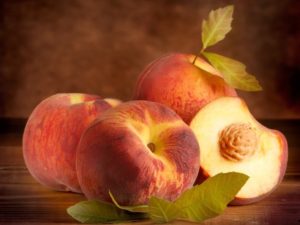
Can peaches during pregnancy and breastfeeding
During the period of gestation, fruit fruits help women cope with toxicosis, prevent the development of anemia and saturate the body with important vitamins. However, you need to remember about the strong diuretic properties of fruits and not overuse. The benefits of peaches during pregnancy will appear only with a dosage of no more than 2 fruits per day.
During breastfeeding, it is better to reintroduce the product into the diet a few months after childbirth. It can harm the baby if there is an allergy, so it is better to play it safe.
The benefits of peaches for weight loss
There are very few calories in fresh fruits, so they are ideal for dietary nutrition. In addition, the fiber contained in the fruit will additionally contribute to weight loss, speed up metabolism and help remove all toxins from the body.
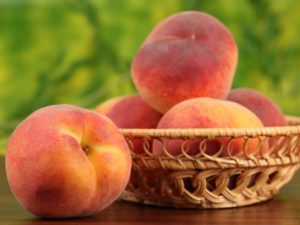
It is especially pleasant that you can eat a peach at night while losing weight - a low-calorie product will help remove the feeling of hunger, but will not harm the figure. If you consume a few slices shortly before bedtime, it will be much easier to fall asleep.
Features of the use of peaches for certain diseases
The properties of peaches can be both beneficial and harmful. You need to know how to eat them for some acute or chronic ailments so that the state of the body does not worsen.
With diabetes mellitus
Fructose is a part of the fruits, so you can use them with diabetes mellitus - fruits do not cause serious harm to the body. Moreover, phenols in the composition speed up metabolism, and this is very useful for diabetics.
However, in the use of fruit, you need to know when to stop - a couple of peaches a day will be enough. Also, do not eat overripe peaches or too sweet varieties with high calorie content.
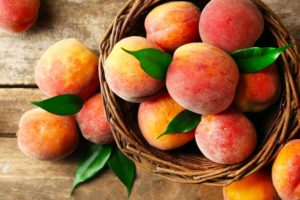
With pancreatitis
Chronic inflammation of the pancreas should be the reason for a very careful approach to any fruit - including peaches. During the period of exacerbation, they cannot be consumed at all, so as not to irritate the pancreas once again. During remission, the use of jelly, mousse and jelly, as well as fresh fruits in very small quantities, is allowed.
With gastritis and ulcers
During an exacerbation of gastritis or peptic ulcer disease, it is better to remove fresh peaches from the diet.Their properties can negatively affect the state of the body and cause harm, since the fruits stimulate the production of gastric secretions and increase peristalsis.
But when the exacerbation begins to decline, you can return compote or jelly without sugar to the diet. You can also boil peaches and make mashed potatoes from them, add pieces of fruit to cereals and cottage cheese. The main thing is not to overuse and eat fruit only on a full stomach.
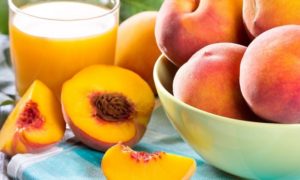
The benefits and harms of canned peaches
In the winter season, fresh peaches are in short supply and are being replaced by processed fruits. For example, canned peaches are in demand - they can be stored for a very long time, and at the same time they retain excellent taste.
The benefits of peaches in syrup are not much lower than that of fresh fruits - vitamins and useful minerals are present in them in full. The product has a number of valuable properties - for example, it serves as an excellent remedy for nausea, promotes the digestion of fatty foods, improves gastric secretion and accelerates digestion.
However, processed peaches have their drawbacks. The product is high in calories and damages the figure - it is better not to eat it on a diet. The harm of canned peaches will also manifest itself in diabetes mellitus, since the fruits are preserved in a solution with a high sugar content.
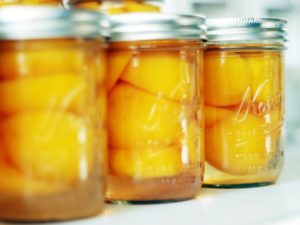
Are dried and sun-dried peaches good for you?
Another common type of fruit is dried or withered peaches. They are also in great demand during the cold season, they are used to make jams, compotes and preserves.
The health benefits of dried peaches and the value of dried fruits are ambiguous. On the one hand, their properties are very useful in vascular and heart diseases, gastric disorders, nausea and vomiting. However, their calorie content is very high - as much as 253 calories. Therefore, on a diet and obesity, it is better not to use such a product, peaches will harm the figure.
The benefits of peach pits and peach leaves
It is not only the peach fruits that are beneficial, but other parts of the fruit plant as well.

- Peach leaves are highly prized in folk medicine. On their basis, medicinal decoctions are prepared, which help well with joint pain, migraines, constipation and flatulence, eliminate inflammatory processes in the bladder. It is useful to treat wounds and burns with a decoction of the leaves - this will contribute to rapid healing.
- A fragrant and extremely healthy oil is obtained from peach pits by cold pressing. It is widely used in cosmetology - it can be found in creams, masks, lotions and other care products.
Why is peach juice useful?
Natural juice without chemical additives is an extremely vitamin and healthy drink. It has two valuable properties:
- drink effectively eliminates constipation, and with regular use, in principle, protects against their occurrence, guaranteeing a quick and healthy bowel function;
- juice increases the acidity of the stomach, therefore, it can be a valuable adjuvant for gastritis with low acidity.
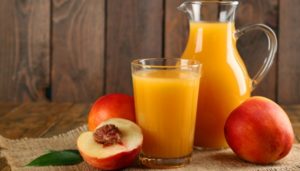
The benefits and harms of peach juice largely depend on when to drink it. It is best to drink the drink on a full stomach; in case of severe hunger, you should not drink juice.
Peach face masks
The pulp of peaches and juice squeezed from the fruit are actively used in home beauty recipes. The benefits of peach for the face are that the fruit improves the color and structure of the skin, moisturizes and refreshes, increases elasticity and slightly rejuvenates. There are many masks that you can easily make at home.
Sensitive skin mask
Skin prone to irritation and acne needs special care - it should be thoroughly cleansed and softened at the same time. The properties of peaches are ideal for this purpose.You can make the following mask at home:
- mix the grated peach pulp with 20 g of grated low-fat cottage cheese;
- add a teaspoon of liquid honey to the resulting product;
- mix thoroughly and massage onto clean skin.
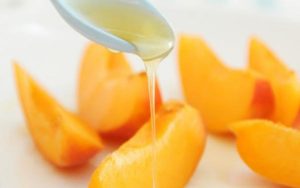
They hold the mixture for a quarter of an hour, then rinse off, gently blot the face and apply a nourishing cream. It is better to do the procedure three times a week in the evenings - then the beneficial effect will be maximum.
Mask for oily and normal skin
For normal to oily skin care, you can use a peach and starch mask. They do it like this:
- the pulp of one fruit is ground into a fine gruel;
- add a teaspoon of starch;
- mix thoroughly and spread over the skin.
The mask is washed off after 20 minutes, and the procedure is repeated three times a week. The mask has a double effect - the peach pulp softens the skin, and the starch slightly narrows the pores and removes excess oiliness.

Freckle lightening mask
Not all women like bright freckles on the face, but getting rid of them can be difficult. Masks based on peach help to solve the problem - the properties of fruit acids in this product contribute to an even distribution of the melanin pigment. It is not difficult to prepare a mask, it is done as follows:
- the pulp of a fresh peach is mixed with a powdered aspirin tablet;
- the contents of one ampoule of vitamin B5 are added to the mixture - the product can be purchased at the pharmacy;
- the mask is applied to clean skin, being careful not to touch the area around the eyes and the nasolabial triangle.
The mixture is kept for a short time - only 10 minutes. It is recommended to apply the mask in the evening and apply a light moisturizer to the face after applying it. By the way, the pulp helps not only from freckles, but also from age spots.
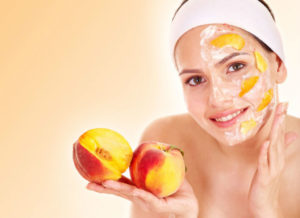
Which is healthier: peach or nectarine
In addition to the usual velvety peaches, in stores you can often find small round fruits with smooth skin - nectarines. Both fruits taste great, and it can be difficult to determine which is healthier.
The composition of both fruits is approximately the same, both of them have similar beneficial properties. However, nectarines are sweeter, and their calorie content is slightly higher - 44 calories per 100 g of product. Therefore, nectarines are of questionable value for diabetics and those who care about the shape.
If you want to eat a sweet and healthy dessert, it is quite possible to purchase juicy nectarines. But for regular use, and especially for health purposes, it is better to buy peaches - they do less harm.
What can be made from peaches
Peach fruits are used in cooking in a wide variety of forms. Of course, fresh fruits are most popular - peaches are consumed on an empty stomach or after meals, they perfectly refresh in the hot season.
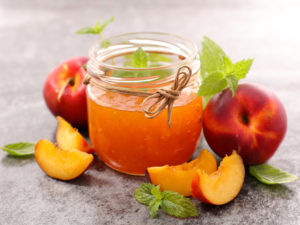
But fruit can be cooked in the same way. They are used to prepare:
- preserves and jams;
- delicious compotes and jelly;
- homemade alcoholic liqueurs and sweet liqueurs;
- pies, muffins and casseroles;
- light, low-calorie salads.
Pieces of fresh fruit are often added to cereals - breakfast peaches with cereals improve the taste of dishes and increase their benefits.
Harm of peaches and contraindications
Even the beneficial properties of peaches can be harmful if consumed without any measure - or if there are contraindications. Fruit should be excluded from the diet:
- with gastritis, ulcers and other diseases of the stomach with an increased level of acidity;
- with individual allergy to fruit - although peaches rarely cause allergic reactions, such cases are still recorded.
Also, you need to use the fruits with caution with a tendency to obesity and diabetes. It is not necessary to refuse fruits, but their quantity must be controlled - the daily rate should not exceed 2 pieces.
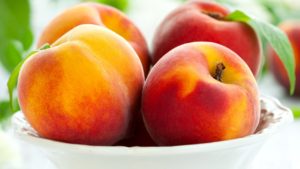
How to choose and store peaches
To get the most out of the fruit, you need to choose the right one.When buying, you need to watch:
- for coloring - high-quality fruits do not have green or dark spots, have a uniform yellow or reddish color, the place of attachment of the stalk is not dry or rotten;
- in appearance - the fruit should not have darkened soft barrels;
- for flavor - if the peach is fully ripe, it gives off a distinct pleasant smell, which is not characteristic of unripe or overripe fruits.
It is very important that the fruit is natural, not treated with chemicals for better preservation. However, this can only be determined by cutting the fruit. A good peach will have juicy flesh, while a chemically treated peach will have a dry, dehydrated and tough flesh.
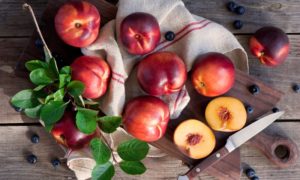
Store fruits in the refrigerator on a dry shelf. They retain their freshness for about a week, but it is better to eat the fruit earlier - in a few days they will lose some of their juiciness and taste.
Conclusion
The benefits and harms of peaches depend on how you eat them. In the absence of allergies and serious diseases, fruit fruits will be very beneficial to health and will delight you with a pleasant sweet taste in any form - fresh, dried or canned.

